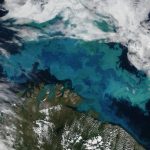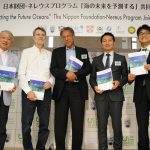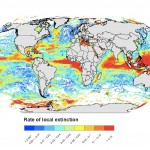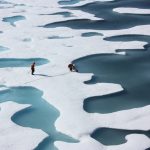Scientists play a pivotal role in shaping climate change discussion.
But for William Cheung, it’s more than that. Being a scientist means digging deeper and highlighting undercovered topics.
Cheung, Associate Professor at UBC’s Institute for the Oceans and Fisheries (IOF) and the Co-Director of the Nereus Program, was an invited speaker on a recent international panel discussion about climate change. Cheung presented on his work as a Lead Author in the Intergovernmental Panel on Climate Change (IPCC) at the University of Tokyo on April 15. The meeting was organized and chaired by Masahiro Matsura of the University of Tokyo.
“I talked about my vision and my opinions about what the role of scientists are at the IPCC, and, more generally, in discussing climate change issues, particularly in the ocean,” he says. “And I used Nereus Program as a case study to illustrate that―because the Nereus Program is a realization of my visions of how scientists should provide science that helps to inform policy.”
Nereus is an example of communicating science effectively across all levels, from biology to policy. And the work the program is doing is elevating important issues to be discussed on an international level.
In particular, Cheung raised the need to include discussion of climate change impacts on vulnerable but unrepresented areas and groups, such as aboriginal fisheries. This undercovered topic is a main research theme in Nereus Program.
“At the moment, this issue is not well-represented in the discussion about climate change,” he says. “However, based on our research, we know that this group is particularly vulnerable to environmental change.”
One of the main questions that came out of the panel discussion was on the actual role of scientists in research. Should a scientist be someone who just provides information, or should they place a role in advocacy, too?
Cheung stresses that there should be a fine balance.
“Nereus program aims to conduct research and provide an unbiased view about the oceans under global change,” he says. “But we focus on topics and issues that are policy relevant at the global level, such as understanding impacts of climate change on marine ecosystems and fisheries.”
There was also plenty of discussion and debate at the Third International Symposium on the Effects of Climate Change on the World’s Oceans from March 23 to 27 in Santos City, Brazil. Cheung, together with Charlie Stock (Nereus Principle Investigator) and Rebecca Asch (Nereus Fellow), presented the latest findings of their research.
Cheung co-convened a workshop on “Addressing uncertainty in projecting climate change impacts in marine ecosystems”, a research topic that the Nereus Program is currently tackling. He also presented the paper “Transforming fisheries management to build climate-resilience in seafood security of coastal countries,” which examines the potentials for international ocean governance to aid regional implementations of climate change adaptation policies.
“This paper looks at how global fishery governance will actually help coastal countries, especially those who are vulnerable to climate change, adapt to the near-term impacts,” Cheung says.
While the long-term climate change impacts on fisheries depend strongly on how well we mitigate greenhouse gas emission, near-term impacts, unfortunately, are inevitable. Understanding the responses of fish and fisheries to climate change and integrating this knowledge into fisheries management will make a major difference.
“Our research shows that climate change are already affecting fisheries through changes in abundance, distribution and composition of fisheries catches,” Cheung says. “By improving resilience of marine ecosystems through, for example, reduction of other environmental stressors such as overfishing and pollution, we can reduce the risk of impacts on fisheries.”
by Emily Fister







